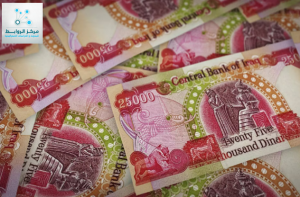The Iraqi dinar: revealing the reasons for its uncontrolled fluctuations
The Iraqi dinar: revealing the reasons for its uncontrolled fluctuations
6-6-2023
 Researcher Shatha Khalil*
Researcher Shatha Khalil*
The economic meaning of a dollar’s exchange rate to the value of one country’s currency, specifically the US dollar, in relation to another. It represents the price at which one currency can be exchanged for another. Exchange rates fluctuate constantly due to various factors such as supply and demand, interest rates, economic conditions, geopolitical events, and government policies. When the exchange rate of the dollar increases, it means that the US dollar is stronger compared to the other currency, and vice versa. Exchange rates have significant effects on international trade, tourism, investments, and the general economy of the countries participating in the currency exchange.
The situation of the Iraqi dinar today can be described as uncontrolled fluctuations, which are not subject to a specific exchange framework. Although it is informal, it shows an informal vibe. In essence, it adheres to a clean float system, in which the interaction between supply and demand in the foreign exchange market determines its value.
The Iraqi citizen (the employee) suffers from these fluctuations that put the life of the citizen at stake and confusion. For example, the salary of an Iraqi employee was equivalent to about 411 US dollars in February, when the exchange rate exceeded 1,700 dinars against the dollar; And when comparing the same salary with the exchange rate before these fluctuations, he would have lost about 250 thousand dinars from his monthly salary, which is not a small amount for a citizen who lives on the salary.
The Iraqi government is trying to control prices in the parallel markets, i.e. (the black market), as the commercial markets witnessed a decline in the exchange rate in the last period, but it has risen again, which indicates an economic problem that is still present in the country.
Among the reasons for this fluctuation in black transfers are:
• One of the reasons for the instability of the exchange rate of the dollar in the Iraqi market, which is a method used by traders is to withdraw the dollar from the market and not buy it from the central bank after the strict controls it imposed.
• That money goes to finance the trade of these merchants, and it leaves Iraq through bags or is transferred through unofficial offices and companies, which caused an increase in the value of the dollar in the market and its instability.
• The lack of approval of the budget during the past (May) of the exchange rate also greatly affected the imbalance, and the price of the dollar in the market began to approach stability at 1450 dinars per dollar; Central bank sales in the currency auction also returned to their previous level at $300 million per day, before the exchange rate rose again.
Among the most important effects of exchange rate fluctuations on individuals who receive a salary and how it affects their financial resources are the following:
Purchasing power: When the exchange rate fluctuates, the cost of imported goods can change. If the value of the domestic currency increases against the foreign currency, imported goods may become cheaper. This can increase the purchasing power of individuals, allowing them to buy more with the same amount of money. Conversely, if the domestic currency weakens, imported goods may become more expensive, reducing purchasing power.
• Inflation: Fluctuations in exchange rates can affect inflation rates. If the local currency weakens, it could lead to higher inflation as the cost of imported goods and raw materials increases. Inflation erodes the value of money, reducing the purchasing power of people’s salaries.
• Cost of Living: Exchange rate fluctuations can affect the overall cost of living. For example, if Iraq is so dependent on imports, a weak local currency can increase the cost of imported goods and services. This, in turn, can lead to higher prices for basic necessities, such as food, fuel and medicine, making it more difficult to manage their expenses with a fixed salary.
• Travel and Remittances: Individuals who receive remittances from abroad or travel to foreign countries for the purpose of trade or tourism may be directly affected by fluctuations in exchange rates. If the local currency weakens, it means that they will get less money when converting the foreign currency into the local currency. This can reduce the amount of money they have available to spend or save.
• Investments and Savings: Fluctuations in exchange rates can affect the value of investments and savings held in foreign currencies. If the local currency strengthens, it can increase the value of these assets when converted into the local currency. Conversely, a weakening of the local currency can reduce the value of foreign investments and savings.
It is important to note that the specific impact of exchange rate fluctuations on individuals can vary depending on their specific circumstances, the nature of their expenditures, and the general economic conditions of the country’s economy, which greatly affect the life of the Iraqi citizen.
In conclusion, at present, the Iraqi dinar is experiencing unpredictable fluctuations, and lacks a well-defined exchange system. Although it is informal, it shows a certain degree of dynamism. In effect, it operates as a freely floating currency, adhering to the principles of supply and demand within the foreign exchange market.
Economic Studies Unit / North America Office
Rawabet Center for Research and Strategic Studies
rawabetcenter.com
